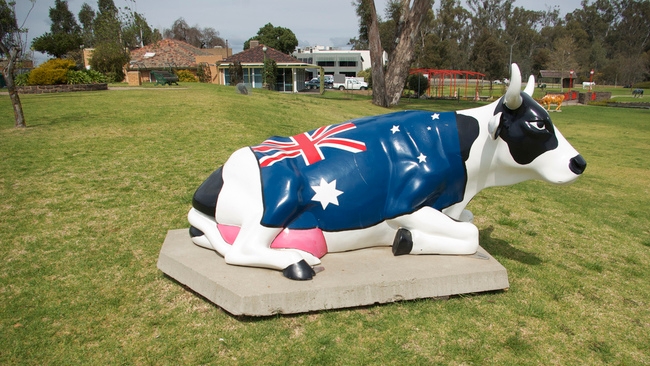
The share price of Victorian dairy processor Warrnambool Cheese and Butter (WCB) has more than doubled over recent weeks in response to a takeover tussle between Australian publicly listed company Bega, Canada’s publicly listed Saputo and Australian cooperative Murray Goulburn (MG).
MG is Australia’s largest milk processor. Its 2,400 farmer-shareholders produce a third of Australia’s milk which is sold in domestic and export markets. Devondale is its main retail brand.
A vote of confidence in the Australian dairy industry
Saputo is one of the world’s ten largest dairy manufacturers. It trumped Bega’s initial offer for WCB, and then raised its bid to trump MG when it entered the fray. Saputo clearly thinks there is money to be made producing dairy products in Australia.
The key ingredients according to chief executive Lino Saputo Jnr are a cost-competitive and reliable supply base (that’s the dairy farmers), and proximity to growing and profitable Asian markets. Saputo’s interest can be taken as a vindication of Australian politicians' views that Australia is well placed to benefit from an impending “dining boom”.
But what about the farmers?
Up until the recent takeover activity the main news coming out of the south-west Victorian dairy industry was of crisis. A depressed milk price and challenging seasonal conditions pushed some farmers to the wall. Are these stories connected? Does corporate confidence signal better times ahead for farmers?
One dairy farmer with strong views on this is Roma Britnell, from Woolsthorpe, 25km north of Warrnambool. As well as being a director of a family-owned company that milks 1,000 cows across three farms, Roma is also involved in the wider industry through her roles as a United Dairy Farmers of Victoria regional policy councillor, and Australian Dairy Farmers national councillor. She is also a former Victorian Rural Woman of the Year.
Time for Australian farmers to understand the benefits of cooperation
Based on her 2010 world tour as a Nuffield Farm Scholar Roma is convinced there is an opportunity for Australian agriculture to benefit from rising global food demand. But the benefits won’t necessarily flow to farmers:
“Having ownership post farm gate is imperative to farmers' ability to influence the price they receive and therefore their future business sustainability. We don’t and can’t influence the international milk price. However, ownership of the product further along the supply chain by farmers does determine how much of the profit (and losses) stay with us.”
Roma is a Murray Goulburn supplier-shareholder, and a passionate believer in cooperative principles: “Without an efficient farmer-owned model to sell through we would be at a significant disadvantage. It seems in Australia we are not listening. Everywhere else I went this was considered a no brainer.”
Global competition more important than local competition
Murray Goulburn previously attempted a takeover of WCB in 2010, but withdrew after receiving advice from the Australian Competition and Consumer Commission (ACCC) that it was concerned about reducing competition in the milk processing industry. Roma argues this is the wrong focus: “It’s the ability of the Australian dairy industry to compete globally that is the main game for farmers, and to win that game we need a larger farmer-owned processor.”
This time around Murray Goulburn is attempting to bypass the ACCC by making an application to the Australian Competition Tribunal for authorisation of the merger on national interest grounds, and has suggested that the Foreign Investment Review Board shouldn’t make a ruling on Saputo’s offer until Murray Goulburn’s application has been considered.
Cooperate or perish?
Tim Mazzarol has argued that, facing global competition and a powerful retail sector, farmers have only three options to strengthen their position: “get larger, find niches or cooperate.”
For Roma Britnell a merger between WCB and Murray Goulburn is an opportunity that may never come again to strengthen farmer cooperation in the dairy industry: “There are lots of variations of the cooperative model around the world so, if the current one isn’t to the liking of our community of farmers, we can change that. But if we lose control it’s going to be very hard, if not impossible, to regain it.”
Not all dairy farmers support the cooperative model, and not all are fans of Murray Goulburn. But MG CEO Gary Helou is convinced the cooperative needs to grow for it, and the Australian dairy industry, to thrive. If he’s right then the WCB battle, which still has a long way to run, may indeed be a crossroads for the industry.
The author
Michael Santhanam-Martin
PhD Candidate at University of Melbourne
This article was republished with permission from The Conversation
| < Prev | Next > |
|---|




